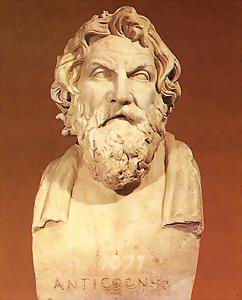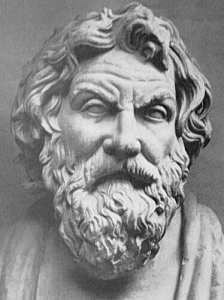
|
|
|
|

|
This quotation is an aphorism attributed to Antisthenes in the fifth section of "The Life of Antisthenes" in the sixth book of Laertius's exhaustive Lives and Opinions of Eminent Philosophers. Antisthenes was an Athenian philosopher and is considered to be the founder of the cynic sect. He was born in 440 B.C.E. by a Thracian of Phrygian mother, and thus only half a citizen. He earned fame through the valor which he displayed in the Battle of Tangora. After this, he began to study under the sophist Gorgias. However, he became increasingly dissatisfied with Grogias's teachings and after a chance meeting with Socrates, he decided to abandon his sophist views. He became one of Socrates' most ardent followers, and Socrates' impression on him is clearly evident throughout Antisthenes' teaching. Like Socrates, Antisthenes believed that virtue was necessary and sufficient for true happiness. He also felt that virtue could be taught, and once the knowledge was acquired it could not be lost. Furthermore, his postulation that each individual is unique had interesting implications for ethics and for the theory of knowledge. |
